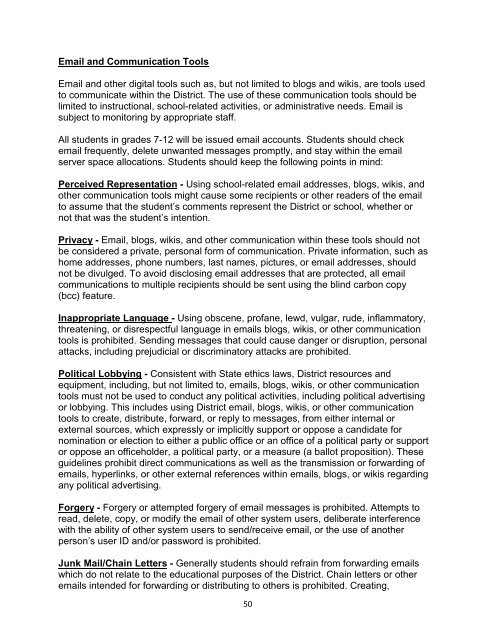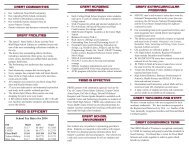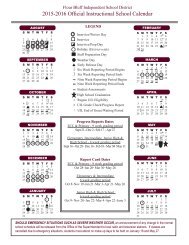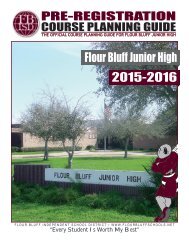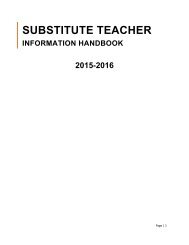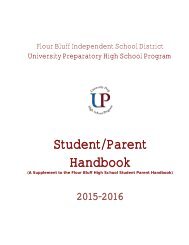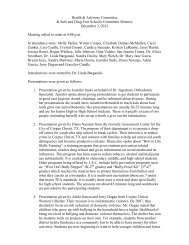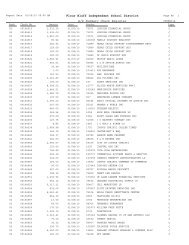Student/Parent Handbook
Campus Handbook - Flour Bluff Independent School District
Campus Handbook - Flour Bluff Independent School District
Create successful ePaper yourself
Turn your PDF publications into a flip-book with our unique Google optimized e-Paper software.
Email and Communication Tools<br />
Email and other digital tools such as, but not limited to blogs and wikis, are tools used<br />
to communicate within the District. The use of these communication tools should be<br />
limited to instructional, school-related activities, or administrative needs. Email is<br />
subject to monitoring by appropriate staff.<br />
All students in grades 7-12 will be issued email accounts. <strong>Student</strong>s should check<br />
email frequently, delete unwanted messages promptly, and stay within the email<br />
server space allocations. <strong>Student</strong>s should keep the following points in mind:<br />
Perceived Representation - Using school-related email addresses, blogs, wikis, and<br />
other communication tools might cause some recipients or other readers of the email<br />
to assume that the student’s comments represent the District or school, whether or<br />
not that was the student’s intention.<br />
Privacy - Email, blogs, wikis, and other communication within these tools should not<br />
be considered a private, personal form of communication. Private information, such as<br />
home addresses, phone numbers, last names, pictures, or email addresses, should<br />
not be divulged. To avoid disclosing email addresses that are protected, all email<br />
communications to multiple recipients should be sent using the blind carbon copy<br />
(bcc) feature.<br />
Inappropriate Language - Using obscene, profane, lewd, vulgar, rude, inflammatory,<br />
threatening, or disrespectful language in emails blogs, wikis, or other communication<br />
tools is prohibited. Sending messages that could cause danger or disruption, personal<br />
attacks, including prejudicial or discriminatory attacks are prohibited.<br />
Political Lobbying - Consistent with State ethics laws, District resources and<br />
equipment, including, but not limited to, emails, blogs, wikis, or other communication<br />
tools must not be used to conduct any political activities, including political advertising<br />
or lobbying. This includes using District email, blogs, wikis, or other communication<br />
tools to create, distribute, forward, or reply to messages, from either internal or<br />
external sources, which expressly or implicitly support or oppose a candidate for<br />
nomination or election to either a public office or an office of a political party or support<br />
or oppose an officeholder, a political party, or a measure (a ballot proposition). These<br />
guidelines prohibit direct communications as well as the transmission or forwarding of<br />
emails, hyperlinks, or other external references within emails, blogs, or wikis regarding<br />
any political advertising.<br />
Forgery - Forgery or attempted forgery of email messages is prohibited. Attempts to<br />
read, delete, copy, or modify the email of other system users, deliberate interference<br />
with the ability of other system users to send/receive email, or the use of another<br />
person’s user ID and/or password is prohibited.<br />
Junk Mail/Chain Letters - Generally students should refrain from forwarding emails<br />
which do not relate to the educational purposes of the District. Chain letters or other<br />
emails intended for forwarding or distributing to others is prohibited. Creating,<br />
50


